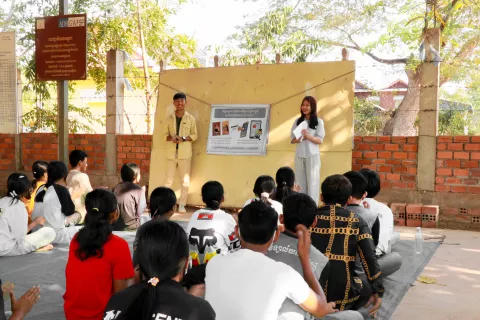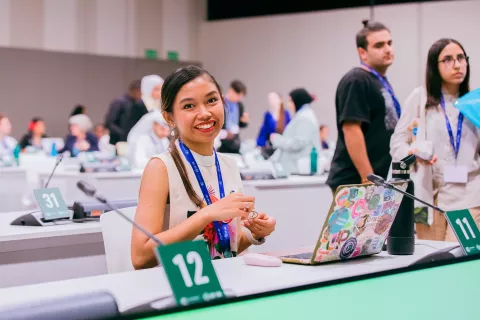As I sat in the dark, amid the dim lights of hundreds of mobile phones, eagerly awaiting the kick-off speech for Techsauce Global Summit, I thought to myself: “Why am I here?”. I’m not a techie. I’m not an entrepreneur. I work in Adolescent Development and Participation at UNICEF, where my days are filled with acronyms, reports, and proposals, but also a fierce drive to change the world for children.

This drive is the reason why I attended Southeast Asia’s largest tech conference, which brings together entrepreneurs, students, venture capitalists, and tech companies to showcase their latest innovations and network. At the conference, my colleagues and I were leading a workshop looking at how tech solutions could be applied to the climate crisis.
In order to reach its goals, UNICEF must constantly innovate. Among other things, this means that it must develop new partnerships with stakeholders who can bring different kinds of expertise to the table. Techsauce provided the perfect platform to network with Southeast Asia’s leading innovators, in the hopes of identifying new ways of collaborating.
So, what did I learn?
1. When it comes to frontier technology, no one is too young (or too old!) to get involved
Some of the most inspiring sessions I attended were led by young people in their teens, as young as 10 years old! These bright young minds were starting online initiatives and companies, and often spoke about the positive influences technology can have on their lives and the world.
I was impressed with Irawadee Thawornbut, a 15-year old from Phuket who founded Sandee for Good and went on to start entrepreneurship clubs at her school. Similarly, Kadea Takenaka, just 10 years old, is very likely the youngest blockchain entrepreneur around. She teaches other children what blockchain is about, through her initiative KIDLetCoin. These two young women both emphasized the role played by their parents in motivating them to explore, take chances, and learn wherever they can (not only within the confines of school).
To me, what was most glaring throughout the conference was the absolute need for UNICEF to keep up with the tech conversation in order to stay relevant and deliver results. Often my colleagues (and I!) joke “I’m too old to understand blockchain”, or “UNICEF is too bureaucratic to try something new”. The truth is, those excuses are no longer acceptable. Techsauce reminded me that while I don’t need to be an expert in everything blockchain or AI, I certainly need to know how frontier tech works to identify potential uses in my work.
2.Tech innovators want to be change-makers, but are not quite there yet
“We’re not troublemakers, but changemakers”, said Oranuch Lerdsuwankij and Amarit Charoenphan (CEO and CCO of Techsauce, respectively). Their opening speech set the tone of the conference by highlighting the potential for tech solutions to address pressing global challenges, and encouraging participants to collaborate to make the world a better place.
In fact, two full days of the agenda were dedicated to Social Impact at one of the event’s 15 stages, with panel speakers from both public and private sector. In addition to discussing the potential for tech to support areas such as financial services, education, and health, the climate crisis was repeatedly emphasized. Gita Wirjawan (previously Indonesia’s Minister of Trade, and Founder of Ancora Group) even pointed out “We’re at a tech conference and we spent the last 15 minutes on climate change. Most people don’t even think it is a problem that they are working on.”
Listening to the speakers and panelists, though, I noted that discussions mainly revolved around the potential of innovative solutions, rather than exploring how they could be applied in practice.
Often, existing solutions are not yet targeting the most vulnerable groups, or the most hard-to-reach areas, due to barriers such as lack of IT infrastructure, constraints to start-up financing, and expectations of financial returns. These challenges relate to a lack of incentives for tech entrepreneurs to spend resources addressing social and environmental challenges.

3. Big data runs through the veins of tech companies
“Data tells us exactly what the consumer needs (…) [and] helps us make products with impact” said Crystal Widjaja, SVP of Business Intelligence and Growth at Go-Jek.
The idea of constantly returning to raw data for intelligence resonated with me, since big data is something UNICEF absolutely needs. Crystal spoke about how her team regularly accesses real-time data in order to inform the firm’s decisions to improve its service offering and develop new products.
UNICEF works on massive, complex issues with long-term national, regional and global repercussions. We need to know things like how many adolescents are out of school, how many struggle with mental health issues, and how many have access to sex education materials. Such data is hard to come by and often outdated as it relies on government surveys using traditional methods. Instead, using real-time data collected on a daily basis at all levels of the organization – from field officers delivering vaccines, to regional advisors advocating for curriculum changes – would certainly support UNICEF’s mission and maximize its impact.

Where does this lead us?
Although I definitely left Techsauce feeling like I had learned a lot, I also believe that UNICEF can extensively support the tech community. Techpreneurs recognize the potential for their solutions to generate social and environmental benefits, but most aren’t taking action. There is space here for UNICEF to help.
First, UNICEF is familiar with the root causes of many social and environmental issues, and can identify country-level “pain points” that start-ups can help address. Second, UNICEF can connect the tech community to relevant government institutions and partners that could support scale-up. Third, UNICEF is well-versed in designing education curricula, and can respond to the tech community’s calls for upskilling the next generation in human-centric skills like creativity, relationship management, and empathy. These are just a handful of examples.
The key, as emphasized by Martin Ford (Futurist and Author) and Audrey Tang (Digital Minister, Taiwan), is to break down barriers and facilitate dialogue between people who don’t normally talk to each other, typically the private sector (including tech) vs. public sector and NGOs. This includes getting them to “hang out together” – meet regularly, eat together, work out-loud. Naturally, they will eventually discover a new language, she said. So here’s to continuing the conversation. We cannot avoid the reality that lasting and sustainable change must be driven
About the author:
Allison Morris is an Adolescent Development Specialist at UNICEF EAPRO






